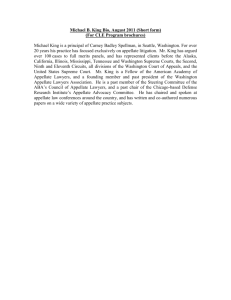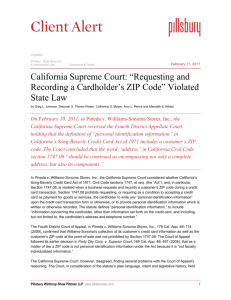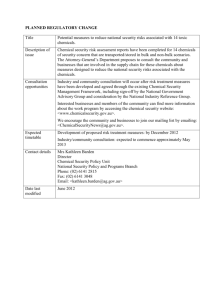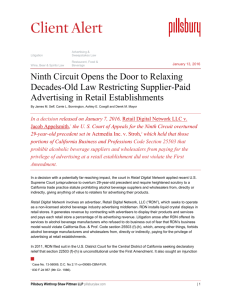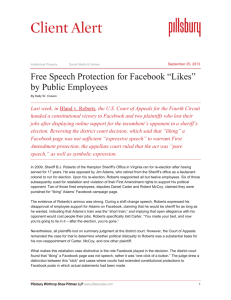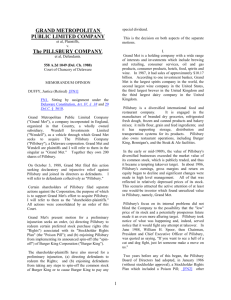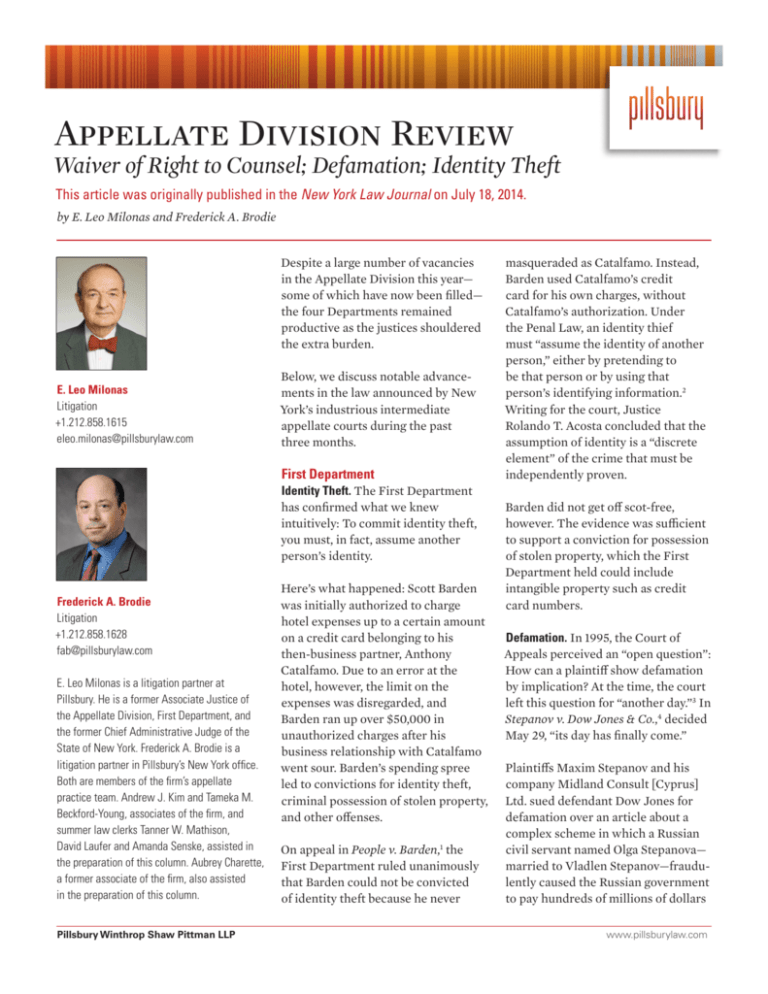
Litigation
Appellate Division Review
Waiver of Right to Counsel; Defamation; Identity Theft
This article was originally published in the New York Law Journal on July 18, 2014.
by E. Leo Milonas and Frederick A. Brodie
Despite a large number of vacancies
in the Appellate Division this year—
some of which have now been filled—
the four Departments remained
productive as the justices shouldered
the extra burden.
E. Leo Milonas
Litigation
+1.212.858.1615
eleo.milonas@pillsburylaw.com
Below, we discuss notable advancements in the law announced by New
York’s industrious intermediate
appellate courts during the past
three months.
First Department
Identity Theft. The First Department
has confirmed what we knew
intuitively: To commit identity theft,
you must, in fact, assume another
person’s identity.
Frederick A. Brodie
Litigation
+1.212.858.1628
fab@pillsburylaw.com
E. Leo Milonas is a litigation partner at
Pillsbury. He is a former Associate Justice of
the Appellate Division, First Department, and
the former Chief Administrative Judge of the
State of New York. Frederick A. Brodie is a
litigation partner in Pillsbury’s New York office.
Both are members of the firm’s appellate
practice team. Andrew J. Kim and Tameka M.
Beckford-Young, associates of the firm, and
summer law clerks Tanner W. Mathison,
David Laufer and Amanda Senske, assisted in
the preparation of this column. Aubrey Charette,
a former associate of the firm, also assisted
in the preparation of this column.
Pillsbury Winthrop Shaw Pittman LLP
Here’s what happened: Scott Barden
was initially authorized to charge
hotel expenses up to a certain amount
on a credit card belonging to his
then-business partner, Anthony
Catalfamo. Due to an error at the
hotel, however, the limit on the
expenses was disregarded, and
Barden ran up over $50,000 in
unauthorized charges after his
business relationship with Catalfamo
went sour. Barden’s spending spree
led to convictions for identity theft,
criminal possession of stolen property,
and other offenses.
On appeal in People v. Barden,1 the
First Department ruled unanimously
that Barden could not be convicted
of identity theft because he never
masqueraded as Catalfamo. Instead,
Barden used Catalfamo’s credit
card for his own charges, without
Catalfamo’s authorization. Under
the Penal Law, an identity thief
must “assume the identity of another
person,” either by pretending to
be that person or by using that
person’s identifying information.2
Writing for the court, Justice
Rolando T. Acosta concluded that the
assumption of identity is a “discrete
element” of the crime that must be
independently proven.
Barden did not get off scot-free,
however. The evidence was sufficient
to support a conviction for possession
of stolen property, which the First
Department held could include
intangible property such as credit
card numbers.
Defamation. In 1995, the Court of
Appeals perceived an “open question”:
How can a plaintiff show defamation
by implication? At the time, the court
left this question for “another day.”3 In
Stepanov v. Dow Jones & Co.,4 decided
May 29, “its day has finally come.”
Plaintiffs Maxim Stepanov and his
company Midland Consult [Cyprus]
Ltd. sued defendant Dow Jones for
defamation over an article about a
complex scheme in which a Russian
civil servant named Olga Stepanova—
married to Vladlen Stepanov—fraudulently caused the Russian government
to pay hundreds of millions of dollars
www.pillsburylaw.com
Litigation
in tax “refunds” to shell corporations
that were not entitled to receive them,
including a company called Bristoll
Export. The article mentioned the
plaintiff company when it stated that,
within the shell of Bristoll Export was
“yet another shell company whose
directors work at Midland Consult,
a Russia-focused representative of
offshore banks founded by a former
Russian diplomat named Maxim A.
Stepanov in Cyprus.”
This statement, plaintiffs alleged, was
defamatory by implication because it
falsely suggested they were involved
in the scam.
The First Department disagreed.
Writing for a unanimous panel on
this issue of first impression in New
York’s appellate courts, Justice Paul
G. Feinman held that defamation
by implication requires “a rigorous
showing that the language of the
communication as a whole can
be reasonably read both to impart
a defamatory inference and to
affirmatively suggest that the author
intended or endorsed that inference.”
In Stepanov, the challenged
statements failed that test. The “lone
fact” that Maxim Stepanov shared
a last name with Olga and Vladlen
was “far too attenuated” to support
an implication that he participated in
the fraud.
Consumer Affairs. At least in the small
community of pedicab license holders,
the First Department has confirmed
that you are, in fact, related to your
mother-in-law.
In Zenk Pedicab Rental & Operation
v. NYC Dept. of Consumer Affairs,5
an applicant had sought to renew
his pedicab business license. The
Department of Consumer Affairs
Pillsbury Winthrop Shaw Pittman LLP
(DCA) denied the application because
the petitioner’s mother-in-law also
owned a pedicab business. The New
York City Administrative Code limits
the number of pedicab licenses one
family can hold, and defines “family
member” as “including, but not
limited to, a…parent.”6 DCA reasoned
that a mother-in-law is “sufficiently
comparable to a parent.” A New York
County judge overturned the decision
as arbitrary and capricious, and
DCA appealed.
The First Department sided with
DCA. In a unanimous unsigned order,
the First Department observed that
judicial review should be restricted
to examining whether DCA’s decision
“has warrant in the record and a
reasonable basis in law.” DCA’s view
of mothers-in-law as family members
was “neither irrational nor unreasonable,” and “should have been upheld
on that basis.”
Second Department
Right to Counsel. Waiver of the right
to counsel must be “unequivocal,
voluntary, and intelligent” to be
effective in a civil proceeding seeking
confinement under the Sex Offender
Management and Treatment Act
(SOMTA), a unanimous panel of the
Second Department ruled in State of
New York v. Raul L.7
Raul L. perpetrated a violent sexual
assault in 2003. As the end of his
prison sentence neared, the state
sought a civil commitment order
against him. Raul’s appointed counsel
sought leave to withdraw because of
disagreement over whether the trial
should be adjourned. Raul stated that,
to avoid additional time in custody, he
would represent himself. Although
the Assistant Attorney General
expressed doubts, the trial court
thought Raul’s waiver was sufficient.
Raul proceeded pro se and lost.
On appeal, in a decision authored
by Justice John M. Leventhal, the
Second Department required more.
Just as in criminal cases, the court
ruled, SOMTA’s statutory right to
counsel may be waived effectively
“only after the court conducts a
searching inquiry” and finds that the
respondent waived his rights “intelligently and voluntarily.”
Insurance. Hit-and-run victims may
obtain default judgments in actions
brought directly against the Motor
Vehicle Accident Indemnification
Corporation (MVAIC), the Second
Department held in Archer v.
MVAIC.8
MVAIC provides no-fault and bodily
injury coverage to persons injured
by uninsured vehicles, hit-and-run
drivers, or motor vehicles operated
without permission. Injured plaintiffs
may sue the offending driver, but
may also file a notice of claim with
MVAIC, which then assumes defense
of the action.
Of course, irresponsible drivers
also are likely to default in court.
Therefore, New York’s Insurance
Law gives MVAIC the right to
contest default judgments.9 Upon
receiving notice, MVAIC is afforded
a reasonable time to answer and
defend actions where the driver
has defaulted.
But, what happens when the victim
sues MVAIC directly and MVAIC
itself defaults? In Archer, MVAIC did
not respond to a victim’s complaint
until its answering time had expired,
never requested an extension, and
offered no excuse for the default.
Appellate Division Review
According to Justice Sylvia O. HindsRadix’s opinion for a unanimous
panel, in those circumstances MVAIC
was out of luck. The Insurance Law’s
default provision was intended to
“protect MVAIC from the defaults of,
or possible collusion by, uninsured
defendants.” In actions commenced
directly against MVAIC, such
concerns “are not implicated.”
Third Department
Prisons. Could a cell phone used by a
prisoner to call his wife be “dangerous
contraband”? Yes, according to the
Third Department’s unanimous ruling
in People v. Green.10
Barry Green, incarcerated in
Sullivan County, was strip-frisked
after a correction officer overheard
“one-sided, business-like conversation[s]” emanating from the cell
where Green was the sole occupant.
A cell phone was uncovered from
between Green’s buttocks. Green
explained that he had been speaking
to his wife, with whom he was
experiencing marital problems.
A jury was unmoved and convicted
Green of “promoting prison
contraband.” On appeal, Green
argued that the People had failed to
prove his cell phone was “dangerous
contraband.” In a decision by Justice
John C. Egan Jr., the court disagreed.
Under the Penal Law, “dangerous
contraband” must be “capable of
such use as may endanger the safety
or security of a detention facility or
any person therein.”11 A cell phone is
not “inherently—or even obviously—
dangerous,” the court acknowledged.
Based on the record, however, Egan
explained that a cell phone could
“create a dangerous situation inside
the correctional facility” because
it could be used to facilitate escape,
threaten security, and circumvent
the recording and monitoring of
inmate calls.
Pollution. The owners of contaminated property are relieved of a
financial headache, thanks to the
Third Department. In Thompson
Corners v. NYS Dept. of Envtl.
Conservation,12 the court ruled that
the Department of Environmental
Conservation (DEC) cannot require
“financial assurance for the ongoing
performance of corrective action”
from subsequent owners of property
formerly used as a permitted
hazardous waste facility.
The issue was one of first impression
in New York. DEC had sought to
compel the subsequent owners of
property previously used as a metals
recovery facility to provide “financial
assurance” guaranteeing that
remediation would be completed—for
instance, a surety bond or letter
of credit.
Justice Leslie E. Stein, however,
wrote for a unanimous panel that the
“financial assurance” requirement was
“expressly link[ed]” to the issuance
of permits to operate a hazardous
waste facility. Because the subsequent
owners were not operating such a
facility and did not seek permits, the
requirement did not affect them. Of
course, DEC could still seek redress
from the facility’s former owner, who
remained obligated to remediate
the property.
Fourth Department
Cemeteries. Concerned by complaints
about consumer pricing and unfair
competition in the funeral industry,
New York’s Legislature in 1998
enacted the Anti-Combination Law.
Among other things, the statute
prohibited for-profit businesses
from partnering with not-for-profit
cemeteries to operate crematoria.
To protect existing arrangements,
however, the Legislature included
a “grandfather clause” excluding
“any crematory…if the funeral entity
operated such crematory…prior to
January 1, 1998.”13
In Sheridan Park v. NYS Division
of Cemeteries,14 the petitioners
contended that the grandfather
clause permitted them to relocate
their pre-existing crematory and
operate it at a different location. The
Fourth Department was required to
determine what sort of “grandfather”
the clause contemplated.
In a unanimous unsigned order, the
court agreed with the State Cemetery
Board’s view that the grandfather
clause “applies only to the crematory
that was being operated by petitioners
at the time the Anti-Combination
Law took effect.” The grandfather
clause was intended to “prevent
the forfeiture of existing crematory
structures and facilities,” not to create
a loophole for “a crematory at any
new location.”
Jury Notes. Judges in criminal trials
must respond to jurors’ requests for
information.15 But, what happens
when the jury submits questions and
then reaches a verdict without ever
receiving the answers? In People v.
Mack,16 the Fourth Department ruled
3-1 that the answer is: “reversal.”
Terrance Mack was convicted of gang
assault in the first degree, but only
one eyewitness identified him as a
participant. During a recess, the jury
sent notes requesting a read-back of
the instructions on reasonable doubt
www.pillsburylaw.com
Appellate Division Review
Litigation
and the treatment of a single witness
versus multiple witnesses. The jurors
also asked to hear the eyewitness’
testimony about the defendant
leaving the crime scene.
Before the court responded, however,
the jury sent an additional note saying
it had reached a verdict. The trial
court accepted the verdict without
further mention of the jury notes.
That was error, the Fourth
Department concluded. The jury
requests demonstrated the jurors’
“confusion and doubt” about “crucial
issues” in the trial. Even without an
objection from defense counsel, “the
court’s failure to respond to the
jury’s notes seeking clarification of
those instructions before the verdict
was accepted ‘seriously prejudiced’
the defendant.”
Endnotes
1
2014 N.Y. Slip Op. 02527 (1st Dept. April 10, 2014).
2
Penal Law §190.90(1).
3
Armstrong v. Simon & Schuster, 85 N.Y.2d 373, 381 (1995).
4
2014 N.Y. Slip Op 03940 (1st Dept. May 29, 2014).
5
2014 N.Y. Slip Op. 02495 (1st Dept. April 10, 2014).
6
Administrative Code of City of NY §20-249[a].
7
2014 N.Y. Slip Op. 04019 (2d Dept. June 4, 2014).
8
2014 N.Y. Slip Op. 02732 (2d Dept. April 23, 2014).
9
Insurance Law §5214(a).
10
2014 N.Y. Slip Op. 03303 (3d Dept. May 8, 2014).
11
Penal Law §205.00[4].
12
2014 N.Y. Slip Op. 03556 (3d Dept. May 15, 2014).
13
L. 1998, ch. 560, §14.
14
2014 N.Y. Slip Op. 03368 (4th Dept. May 9, 2014).
15
CPL §310.30.
16
2014 N.Y. Slip Op. 03075 (4th Dept. May 2, 2014).
Reprinted with permission from the July 18, 2014 edition of the New York Law Journal© 2014 ALM Media Properties, LLC. All rights reserved.
Further duplication without permission is prohibited. For information, contact 877-257-3382, reprints@alm.com or visit www.almreprints.com.
Pillsbury Winthrop Shaw Pittman LLP | 1540 Broadway | New York, NY 10036 | +1.877.323.4171
ATTORNEY ADVERTISING. Results depend on a number of factors unique to each matter. Prior results do not guarantee a similar outcome.
© 2014 Pillsbury Winthrop Shaw Pittman LLP. All rights reserved.
Pillsbury Winthrop Shaw Pittman LLP
www.pillsburylaw.com

